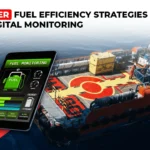6 Tips for Choosing GPS Trackers for Heavy Equipment, Benefits, and How They Work
Posted on October 23, 2023 by Nur Wachda Mihmidati
GPS Tracker for heavy equipment is an electronic device that can track the real-time location and position of heavy machinery using Global Positioning System (GPS) technology. GPS Trackers are commonly used to track vehicles, pets, and even people. In its operation, a GPS Tracker receives signals from GPS satellites and sends location data to a server or application, which can be accessed by the owner to view the device’s location. By utilizing GPS Trackers, owners can remotely monitor the activities and movements of the tracked equipment, ensuring their safety and security.
Benefits of GPS Tracker for Heavy Equipment Rental Businesses
GPS Trackers offer significant advantages to heavy equipment rental businesses in various aspects, including supervision, productivity, and operational costs. Here is a more in-depth explanation of the benefits of GPS Trackers for heavy equipment rental businesses:
Enhancing Supervision
GPS Trackers help improve the supervision of rented heavy equipment. With GPS Trackers, rental businesses can monitor the real-time location of heavy machinery, preventing unauthorized use or theft. Additionally, rental companies can track the usage of equipment by customers, such as usage duration, distance traveled, and more. This helps ensure that the equipment is rented out correctly and helps prevent damage or loss.
Increasing Productivity
In the heavy equipment rental business, the time of equipment usage is crucial. GPS Trackers can enhance productivity by enabling rental businesses to optimize equipment usage schedules. By monitoring the equipment’s usage time, rental companies can efficiently schedule equipment deliveries and pickups, reducing customer wait times. Moreover, businesses can track customer productivity, such as work hours and appropriate usage times, providing recommendations to improve equipment usage efficiency.
Reducing Operational Costs
Heavy equipment rental businesses need to manage operational costs, including fuel expenses, maintenance, and equipment repairs. GPS Trackers help reduce operational costs by providing information about fuel consumption and the appropriate timing for maintenance. By monitoring fuel usage and offering recommendations to minimize fuel consumption, rental businesses can save on operational costs and enhance equipment efficiency. Additionally, regular equipment condition monitoring allows businesses to perform timely maintenance and repairs, reducing long-term maintenance expenses.
Overall, GPS Trackers offer significant benefits to your business, including improved supervision, increased productivity, and reduced operational costs. With these devices, rental businesses can optimize heavy equipment usage and enhance operational efficiency.
How GPS Tracker for Heavy Equipment Works
GPS Tracker for Heavy Equipment operates by using Global Positioning System (GPS) technology to determine accurate location and position. It consists of a GPS chip, antenna, and data processing module that work together to track the equipment’s position.
The working process of GPS Tracker for Heavy Equipment involves three stages:
GPS Signal Reception
First, the GPS Tracker sends signals to GPS satellites orbiting Earth. GPS satellites receive these signals and transmit information about the equipment’s location and time back to the GPS Tracker.
Data Processing
After receiving information from GPS satellites, the GPS Tracker processes the received data to determine the precise location and position of the heavy equipment. The GPS Tracker uses information from multiple GPS satellites to calculate coordinates and establish high-accuracy location data.
Data Transmission
Once the equipment’s location is determined, the GPS Tracker sends this data to a server or application connected to the GPS Tracker. This data can include GPS coordinates, time, and additional information such as speed and direction of equipment movement.
Owners of heavy equipment rental businesses can access this data remotely using an application or computer device connected to the GPS Tracker. This allows them to monitor equipment movements in real time and provide accurate information about equipment usage by customers.
In summary, GPS for Heavy Equipment operates by utilizing Global Positioning System technology to accurately track location and position and transmit this information to a server or application connected to the GPS Tracker. With this technology, heavy equipment business owners can monitor equipment movements in real time and provide accurate information about customer equipment usage.
Tips for Choosing the Best Heavy Equipment GPS Tracker
Selecting the right GPS tracking device for heavy equipment is crucial to ensure the efficiency and effectiveness of your heavy equipment rental business. Here are some tips for choosing the best GPS-tracking device for heavy equipment:
Consider Features and Functionality
Choose a GPS tracking device for heavy equipment that offers features and functionality tailored to your business needs. Some considerations may include real-time tracking of equipment location, notifications if equipment leaves the work area, alerts for equipment damage or failure, and more. Ensure that the GPS tracking device can operate in remote or challenging terrain.
Prioritize Reliability
Ensure that the GPS tracking device you choose has a good reputation for reliability. Heavy equipment is prone to vibrations, dust, and wear and tear, making GPS trackers vulnerable to damage. Make sure the device is durable and robust enough to withstand these conditions.
Evaluate Costs
Verify that the selected GPS tracking device is cost-effective and aligns with your business budget. Take into account additional costs such as subscription fees and installation charges, and ensure that they are affordable and reasonable.
Assess User-Friendliness
Select a GPS tracking device for heavy equipment that is user-friendly and can be easily operated by your employees. Also, ensure that the device offers good customer support and reliable technical assistance in case you encounter any issues.
Consider Integration with Applications
Check whether the chosen GPS tracking device can integrate with the applications you use to manage your business, such as heavy equipment management software or project management software. This will make it easier for you to monitor and manage your heavy equipment effectively.
Evaluate Offline Tracking Capability
Ensure that the GPS tracking device for the heavy equipment you choose can track equipment positions offline when GPS signals are unavailable or disrupted. This is essential to ensure that you can still track equipment locations even when GPS signals are not accessible.
By considering the factors above, you can choose the best GPS tracking device for your heavy equipment rental business. Select a GPS-tracking device that meets your business requirements and helps you manage heavy equipment efficiently and effectively.
Now, the reliable and user-friendly GPS tracker for heavy equipment offered by TransTRACK’s Fleet Management System could be the right choice for your heavy equipment business. With its latest features and real-time heavy equipment tracking capabilities, TransTRACK’s Fleet Management System can help you enhance the efficiency and productivity of your business. Contact TransTRACK for more information and don’t miss the opportunity to improve your business!
Topic :
 Bahasa Indonesia
Bahasa Indonesia









